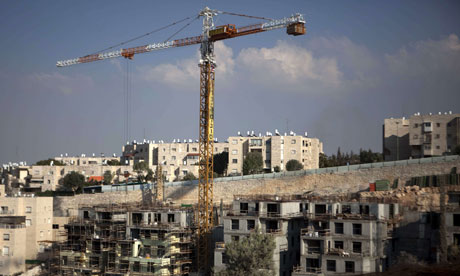Israel plans new settlement of 2,600 that will isolate Arab East Jerusalem
 Thursday, November 24, 2011 at 08:49PM
Thursday, November 24, 2011 at 08:49PM http://www.guardian.co.uk/world/2011/oct/16/israel-settlement-isolate-arab-jerusalem?INTCMP=SRCH
Chris McGreal in Jerusalem Sunday 16 October 2011 19.13 BST
Britain, the EU and the UN condemn Israel's decision as provocative and a further threat to the peace process

Israel has submitted plans to build the first big Jewish settlement in the occupied territories in 25 years, in a move condemned as an "assassination" of attempts to revive peace negotiations.
A leading Israeli peace group, Peace Now, denounced the plan to build 2,600 homes at Givat Hamatos on the southern edge of Jerusalem as a "game changer" because it would virtually cut off the Arab east of the city from the rest of the occupied West Bank.
The UN, the EU and Britain joined the Palestinians in condemning the move as provocative at a time when the major powers are struggling to rekindle negotiations while the Palestinian bid for statehood is still before the UN security council.
The Palestinian leadership, which has said there can be no new talks if settlement building continues, said the plans were further evidence that Israel "wants to destroy the peace process".
Givat Hamatos would form a big part of the crescent of Jewish settlements which, in parallel with the West Bank wall and fence, has increasingly isolated East Jerusalem from the rest of the occupied territories. Israeli peace activists say the intention is to solidify Israel's claim to all of Jerusalem and to minimise the amount of the city ceded to an independent Palestine. Work could begin as early as next year.
A fortnight ago, Israel drew strong international condemnation over plans to expand an existing settlement, Gilo, by about 1,200 homes. Meir Margalit, a leftwing member of the Jerusalem council who holds the portfolio overseeing the east of the city, said that the Givat Hamatos plan had more serious implications because, not only is it much larger but, for the first time in quarter of a century, it established a new colony.
"This is a big deal because this is a new settlement. It's not more houses in an existing settlement but a new one that takes one of the last reserves of land remaining for the Palestinians in East Jerusalem," he said. "I don't want to be overly dramatic but this will be that last nail in the coffin of the peace process.
"The government knows the Palestinians cannot live with this, that settlements are the most important issue for them. The people behind this are pyromaniacs and terrorists because they are lighting fires all over the place that at the end of the day will set up a new wave of terrorist attacks."
The plans were submitted for approval by Israel's interior minister, Eli Yishai, a member of the religious, rightwing Shas party. They are likely to be backed by the prime minister, Binyamin Netanyahu, who is competing with Shas for the support of Jewish settlers and rightwing voters. Netanyahu has repeatedly said that Israel regards itself as free to build anywhere it chooses within the area it defines as Jerusalem, which cuts deeper into the West Bank since the municipal boundaries were extended after the occupation of the east of the city began in 1967.
Givat Hamatos would be the first major new Jewish settlement since Netanyahu approved the construction of nearby Har Homar in 1997, during his first term as prime minister.
The government has sought to minimise the significance of the plans by saying they have been around for several years and that no final decision has been taken. The proposal was originally drafted three years ago and then put on hold. But last week, with attention focused on the pending release of Gilat Shalit after five years captivity in Gaza, they were quietly revived and submitted for a 60-day public comment period, a last step before a final vote on approval. The decision will be made by the Jerusalem municipal council where there is broad support for settlements.
The move was welcomed by David Hershovitz, a rightwing member of the city council's planning committee. He told the Jerusalem Post: "Givat Hamatos is a prerequisite for massive building in Jerusalem."
Saeb Erekat, the chief Palestinian negotiator, said the Givat Hamatos proposal "makes a mockery of … international efforts to bring about a just and lasting peace."
On Sunday, the British foreign secretary, William Hague, condemned "this provocative step, which further encloses East Jerusalem". Catherine Ashton, the EU foreign policy chief, described the Givat Hamatos plans as "deplorable". She said the plans undermine peace efforts by breaching Israel's responsibility to create "an environment of trust conducive to negotiations".
The UN secretary general, Ban Ki-moon, said the Givat Hamatos plans are "contrary to international law".
"Recent developments in this regard have been unacceptable, particularly as efforts are ongoing to resume negotiations," he said.
Margalit said that he believes the government is deliberately seeking to undermine attempts to revive talks.
"From the one side, Netanyahu says he is ready to negotiate; from the other, the government does this and undermines any possibility of negotiations with the Palestinians," he said.
 APJP |
APJP |  Post a Comment |
Post a Comment |